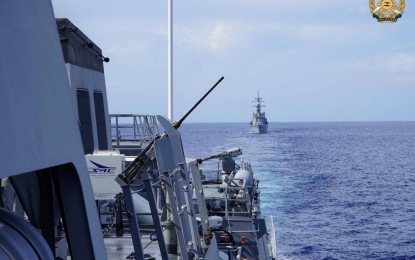
JOINT PATROL. The Philippine Navy's missile frigate BRP Jose Rizal (FF-150) and Japan Maritime Self-Defense Force's destroyer JS Sazanami (DD-113) sail together during the two countries' first maritime cooperative activity in the West Philippine Sea on Aug. 2, 2024. Senate Deputy Minority Leader Risa Hontiveros on Monday (Sept. 30) said joint patrols are a clear display of the Philippines’ resistance to China’s bullying in the WPS. (Photo courtesy of AFP)
MANILA – The joint patrols of Philippine defense forces, together with the United States, Japan, Australia, and New Zealand in the West Philippine Sea (WPS) are a “clear display” of the country’s resistance to China’s bullying, Senate Deputy Minority Leader Risa Hontiveros.
In a statement on Monday, Hontiveros described the exercises as a commitment of the international community to uphold the rules-based order in the entire South China Sea.
"It shows that we who believe in the rule of law will not tolerate any form of violence, threat, or intimidation," Hontiveros said.
"I do think that these (joint patrols) help put China in her place," she added.
Hontiveros further stressed that China must honor its commitments to the international framework established by the United Nations Convention on the Law of the Sea (UNCLOS) and the BBNJ Agreement (the UN agreement on biodiversity beyond national jurisdiction).
She also urged China to cease its aggression in the WPS, being the sole instigator of tensions in the region.
“It has always been clear that it is China who is provoking tensions in the West Philippine Sea – not us – so it is China who must stop her aggression,” Hontiveros said. (PNA)
